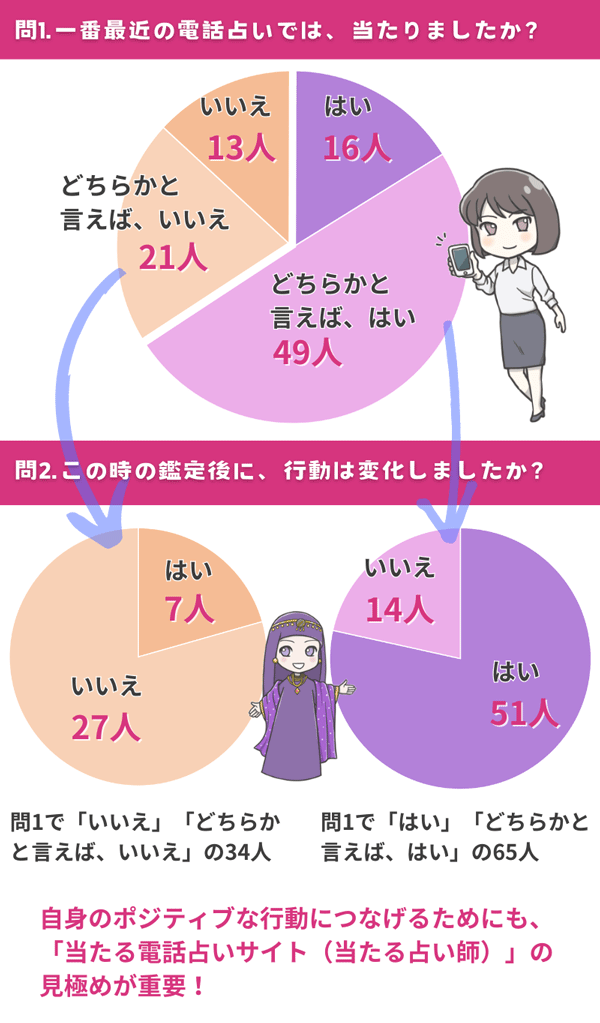電話占いサイトがたくさんあるけど、当たる占い師は誰なのか?
総勢333名で総合ランキングを作りました。
相談する前の準備や心構えも解説。
このページでは、当たる先生と出会うポイントなども併せて、分かりやすく解説していきます。
このページで分かる事
あなたに合ったおすすめの占い師を診断します!
たくさんの占い師を紹介していますが、多すぎて絞り切れないという方も多いと思います。
そんな方に、簡単な3つの質問に答えるだけでおすすめの占い師を見つけることができる診断チャートを作成しました!
悩みや料金別におすすめの占い師を紹介しているので、こちらも試してみてください。
- Q1
- どんな悩みを相談しますか?
電話占い当たるおすすめランキング22選【2024年3月最新】
当たる電話占いサイトをランキング形式で発表していきます。
サイトの特徴やおすすめの占い師なども紹介していくので参考にしてください。
電話占いフィール

| 総合48点 | |
| 的中率 | |
| 鑑定料金 | |
| 初回特典 | |
| 口コミ評価 | |
| 安全性 | |
電話占いフィールは、採用率5%の厳しいオーディションを勝ち抜いた占い師のみが在籍しているので、どの占い師を選んでも的中率が高いです。
毎日朝10時から翌朝5時まで年中無休のサポート窓口があり、占い師選びに迷ったときなどは相談することでオススメの占い師を紹介してくれるサービスもあります。
新規登録するだけで3,000円分の無料ポイントが貰える
ので、ぜひこの機会に電話占いフィールを試してみてください。
電話占いフィールでおすすめの当たる占い師
| 占い師名 | 鑑定料金 | 得意な悩み |
|---|---|---|
 R(アール)先生 R(アール)先生 | 1分あたり 380円 | 恋愛/復縁/縁切り/金銭/など |
 すわこ先生 すわこ先生 | 1分あたり 370円 | 恋愛/不倫/三角関係/出逢い/など |
 結真(ゆま)先生 結真(ゆま)先生 | 1分あたり 300円 | 恋愛/復活愛/仕事/健康/など |
\3,000円分の無料特典アリ/電話占いフィールで
無料特典を使ってみる
電話占いピュアリ

| 総合48点 | |
| 的中率 | |
| 鑑定料金 | |
| 初回特典 | |
| 口コミ評価 | |
| 安全性 | |
電話占いピュアリには、200人を超える占い師が在籍しており、中にはメディア出演する占い師もいます。
また知名度だけでなく、20年以上鑑定実績を持つベテラン占い師など、実力を兼ね備えた占い師ばかりなので的中率がすごく高いです。
初回10分間無料の特典に加え、2回目・3回目の鑑定でもポイントが貰えるので、何度か鑑定をしてもらいたいと思っている方におすすめです。
キャンペーンは時期によって変更されるので、頻繁にサイトをチェックしておくと良いですよ。
電話占いピュアリでおすすめの当たる占い師
| 占い師名 | 鑑定料金 | 得意な悩み |
|---|---|---|
 良風(リョウフウ)先生 良風(リョウフウ)先生 | 1分あたり 300円 | 恋愛成就/出会い/相手の気持ち/など |
 御室勾月(オムロマユリ)先生 御室勾月(オムロマユリ)先生 | 1分あたり 260円 | 男心/女心/複雑な恋愛/三角関係/など |
 夏乃(なつの)先生 夏乃(なつの)先生 | 1分あたり 320円 | 就職/夢/目標/ビジネスパートナー/など |
\初回鑑定10分無料/電話占いピュアリで
無料特典を使ってみる
電話占いピクシィ

| 総合47点 | |
| 的中率 | |
| 鑑定料金 | |
| 初回特典 | |
| 口コミ評価 | |
| 安全性 | |
電話占いピクシィは、恋愛の悩みに特化した占い師が多く在籍しています。
どんな相談でも鑑定可能でアドバイスをくれますが、恋愛系の悩みにはとても強いです。
不倫や複雑な恋愛にも強いので、恋の悩みがある人にはピッタリのサイトです。
新規登録すると、対象占い師の鑑定が初回10分無料になる特典が付いてきます。
1人の占い師ではなく、対象であれば何人でも無料になるので、登録してみてください。
電話占いピクシィでおすすめの当たる占い師
| 占い師名 | 鑑定料金 | 得意な悩み |
|---|---|---|
 牡丹(ぼたん)先生 牡丹(ぼたん)先生 | 1分あたり 320円 | 恋愛系など |
 ako(アコ)先生 ako(アコ)先生 | 1分あたり 350円 | 恋愛/仕事/人生/対人関係 |
 ドロシー先生 ドロシー先生 | 1分あたり 300円 | 恋愛全般/仕事/人間関係/家庭 |
\対象の占い師初回10分無料/電話占いピクシィで
無料特典を使ってみる
電話占いインスピ

| 総合46点 | |
| 的中率 | |
| 鑑定料金 | |
| 初回特典 | |
| 口コミ評価 | |
| 安全性 | |
電話占いインスピには「コンシェルジュサービス」が設置されています。
このサービスを使えば、自分の悩みに合った占い師を紹介してくれるので、はじめて電話占いを利用するという方にはとくにおすすめです。
また、スマホアプリを使えば通話料無料もなるので、あまりお金をかけることができない人にもピッタリです。
新規登録するだけで2,200円分のポイントが貰えるので、お得に電話占いをしたいという方はぜひ試してみてください。
電話占いインスピでおすすめの当たる占い師
| 占い師名 | 鑑定料金 | 得意な悩み |
|---|---|---|
 静香(しずか)先生 静香(しずか)先生 | 1分あたり 500円 | 恋愛全般/独立起業/適性/家族関係 |
 朱璃(しゅり)先生 朱璃(しゅり)先生 | 1分あたり 290円 | 不倫/人間関係/恋愛/など |
 ヴェローナ先生 ヴェローナ先生 | 1分あたり 380円 | 恋愛全般/結婚/仕事/人間関係 |
\2,200円分無料特典アリ/電話占いインスピで
無料特典を使ってみる
電話占いスピカ

| 総合46点 | |
| 的中率 | |
| 鑑定料金 | |
| 初回特典 | |
| 口コミ評価 | |
| 安全性 | |
電話占いスピカは相談実績が86万件以上と、リピーターが多いのが特徴です。
リピーターが多い最大の理由は、占い師の質が良く満足度が高いから。
また、アプリを使えば通話料が無料になるので、無駄な料金が発生しません。
対象の占い師であれば何人でも初回10分無料になるので、自分に合う占い師を探しやすいですよ。
簡単な悩みであれば無料特典でも解決することはできるので、電話占いスピカに登録してみてください。
電話占いスピカでおすすめの当たる占い師
| 占い師名 | 鑑定料金 | 得意な悩み |
|---|---|---|
 さりか先生 さりか先生 | 1分あたり 300円 | 片思い/不倫/相性/縁結び/結婚/など |
 コリンズ福多(ふくだ)先生 コリンズ福多(ふくだ)先生 | 1分あたり 300円 | 片思い/不倫/浮気/男心/三角関係/など |
 Shanti(シャンティ)先生 Shanti(シャンティ)先生 | 1分あたり 500円 | 復縁/不倫/既読・未読無視/片思い/など |
\3,000ポイント無料特典アリ/電話占いスピカで
無料特典を使ってみる
電話占いウィル

| 総合45点 | |
| 的中率 | |
| 鑑定料金 | |
| 初回特典 | |
| 口コミ評価 | |
| 安全性 | |
電話占いウィルには実力派の占い師が150人以上在籍しています。
中には「スクール革命」といった人気番組に出演している先生もいて、実力は電話占いの中でもトップクラスです。
鑑定料も200円台の占い師が多いので、そこまで高額になることもありません。
支払い方法が「先払い」と「後払い」の2つあり、先払い決済で5万円払うと1万円分のポイントが付いてきます。
何度も利用したいと考えている方にはおすすめです。
登録時の特典も豪華で、はじめに3,000円分無料になるだけでなく、優先予約や追加で3,000円分プレゼントなど他のサイトにはない特典が満載です。
特典は月ごとに変わるので、今のうちに登録しておくと良いですよ。
電話占いウィルでおすすめの当たる占い師
| 占い師名 | 鑑定料金 | 得意な悩み |
|---|---|---|
 龍杏和樹(リュウアンカズキ) 先生 龍杏和樹(リュウアンカズキ) 先生 | 1分あたり 260円 | 恋愛全般/人間関係/仕事運/など |
 明澄真矢(あすみまや)先生 明澄真矢(あすみまや)先生 | 1分あたり 380円 | 恋愛関係/ペットの気持ち/など |
 桐一葉(キリヒトハ) 先生 桐一葉(キリヒトハ) 先生 | 1分あたり 360円 | 恋愛成就/トラウマの解消/など |
\3,000円無料特典アリ/電話占いウィルで
無料特典を使ってみる
みんなの電話占い

| 総合44点 | |
| 的中率 | |
| 鑑定料金 | |
| 初回特典 | |
| 口コミ評価 | |
| 安全性 | |
みんなの電話占いの運営会社は株式会社じげんグループです。
東証一部にも上場している会社なので、安心感と信頼感を持って利用できます。
2006年運営開始と実績も長く、利用者から親しまれていますよ。
初回限定ではありますが、最大50%の割引クーポンが貰えます。
LINEから1分程度で登録できるので、みんなの電話占いに登録してみてください。
みんなの電話占いでおすすめの当たる占い師
| 占い師名 | 鑑定料金 | 得意な悩み |
|---|---|---|
 ann(あん)先生 ann(あん)先生 | 1分あたり 444円 | 恋愛/不倫/人生/など |
 ボニー先生 ボニー先生 | 1分あたり 267円 | 恋愛/復縁/不倫/など |
 セラ先生 セラ先生 | 1分あたり 605円 | 復縁/恋愛/結婚/など |
\最大50%の割引クーポン/みんなの電話占いで
無料特典を使ってみる
電話占いシエロ

| 総合44点 | |
| 的中率 | |
| 鑑定料金 | |
| 初回特典 | |
| 口コミ評価 | |
| 安全性 | |
電話占いシエロは会員数が150万人以上と、電話占いの中でも利用者が多いです。
占い師は厳しい審査によって選ばれた方や、メディアで紹介される人気の方のみが在籍しています。
その採用率は200分の1ほどです。
狭き門を突破した実力のある占い師のみになるので、口コミでの評価も高いです。
無料特典も豊富で、対象の占い師なら7人まで初回10分無料で相談することができます。
1分1,000円以上の超高額占い師の鑑定も無料になるので、ぜひ登録してみてください。
電話占いシエロでおすすめの当たる占い師
| 占い師名 | 鑑定料金 | 得意な悩み |
|---|---|---|
 華樹先生 華樹先生 | 1分あたり 300円 | 恋愛/結婚/復縁/仕事/相性/など |
 ふじ先生 ふじ先生 | 1分あたり 300円 | 恋愛/結婚/不倫/家庭/心理/など |
 エリーゼ先生 エリーゼ先生 | 1分あたり 300円 | 恋愛/復縁/仕事/運勢/金運/など |
\7人まで初回10分無料/電話占いシエロで
無料特典を使ってみる
電話占いウラナ

| 総合43点 | |
| 的中率 | |
| 鑑定料金 | |
| 初回特典 | |
| 口コミ評価 | |
| 安全性 | |
電話占いウラナは、上場会社のエムティーアイが運営しています。
この会社は「ルナルナ」や「music.jp」なども運営しているので、安全して利用することができます。
通話料無料で、在籍しているほとんどの占い師が1分200円台で占うことができます。
対象の占い師は初回鑑定10分無料になるので、よりリーズナブルに鑑定してもらいたい方にはおすすめのサイトです。
電話占いウラナでおすすめの当たる占い師
| 占い師名 | 鑑定料金 | 得意な悩み |
|---|---|---|
 史華先生 史華先生 | 1分あたり 280円 | 不倫/同性愛/対人関係/復縁/など |
 ミラー先生 ミラー先生 | 1分あたり 240円 | 対人関係/復縁/縁切り/など |
 瀧山 歩先生 瀧山 歩先生 | 1分あたり 300円 | 結婚/離婚/年の差/など |
\初回鑑定10分無料/電話占いウラナで
無料特典を使ってみる
電話占いリノア

| 総合42点 | |
| 的中率 | |
| 鑑定料金 | |
| 初回特典 | |
| 口コミ評価 | |
| 安全性 | |
電話占いリノアの最大のおすすめポイントはコスパの高さです。
人気実力があって殿堂入りした占い師でも、1分400円で占ってもらうことができます。
実力のある占い師は料金が高くなってしまいますが、その分鑑定も早いので安くなることが多いのでおすすめです。
新規登録すると初回10分無料になる特典が貰えます。
殿堂入りした人気占い師にも使うことができるので、電話占いリノアの占い師の力を体感してみてください。
電話占いリノアでおすすめの当たる占い師
| 占い師名 | 鑑定料金 | 得意な悩み |
|---|---|---|
 ゆきの先生 ゆきの先生 | 1分あたり 400円 | 恋愛成就/出会い/片思い/など |
 咲葵(サキ)先生 咲葵(サキ)先生 | 1分あたり 360円 | 複雑な恋愛/略奪愛/浮気/など |
 神奏(シンソウ)先生 神奏(シンソウ)先生 | 1分あたり 340円 | 職場の人間関係/対人関係/仕事運/など |
\初回鑑定10分無料/電話占いリノアで
無料特典を使ってみる
電話占いカリス

| 総合42点 | |
| 的中率 | |
| 鑑定料金 | |
| 初回特典 | |
| 口コミ評価 | |
| 安全性 | |
電話占いカリスは、話し方や占いの方法など、さまざまな個性を持った占い師を全国から選んでいます。
年齢も幅が広いため自分に合った占い師をすぐに探すことができますよ。
鑑定実績は200万件以上あり、リピーターがたくさんいます。
口コミが5万件以上掲載されている占い師もいて、人気実力が圧倒的です。
新規登録すると2,600円分プレゼント(最大10分)の特典があるので、この機会に電話占いカリスで鑑定してみてください。
電話占いカリスでおすすめの当たる占い師
| 占い師名 | 鑑定料金 | 得意な悩み |
|---|---|---|
 潤(じゅん)先生 潤(じゅん)先生 | 1分あたり 280円 | 恋愛成就/複雑愛/近未来/仕事/など |
 千都(ちとせ)先生 千都(ちとせ)先生 | 1分あたり 280円 | 相手の気持ち/恋愛問題/仕事/など |
 諸縁(ゆかり)先生 諸縁(ゆかり)先生 | 1分あたり 400円 | 気持ち/復縁/不倫/時期/未来/など |
\2,600円分無料特典アリ/電話占いカリスで
無料特典を使ってみる【PR:ティファレト】
電話占いヴェルニ

| 総合41点 | |
| 的中率 | |
| 鑑定料金 | |
| 初回特典 | |
| 口コミ評価 | |
| 安全性 | |
電話占いヴェルニは、運営歴20年の実績を誇り、在籍占い師が1200人を超えます。
占いの館「千里眼」と提携しているので、電話占いだけでなく対面占いも可能です。
占い師のオーディション合格率がわずか3%と厳しく、信頼性が高い占い師が揃っています。
朝9時から翌朝5時までサポートスタッフが常駐しているので、利用者が安心して利用できる環境も整っています。
新規登録者には4,000円分のプレゼントや、初回限定で占い師の優先予約サービスなどの特典がありますよ。
電話占いヴェルニでおすすめの当たる占い師
| 占い師名 | 鑑定料金 | 得意な悩み |
|---|---|---|
 神楽(かぐら)先生 神楽(かぐら)先生 | 1分あたり 440円 | 結婚/離婚/復縁/不倫/縁結びなど |
 魅理亜(みりあ)先生 魅理亜(みりあ)先生 | 1分あたり 390円 | 不倫/年の差/遠距離/金運/など |
 琥珀(こはく)先生 琥珀(こはく)先生 | 1分あたり 440円 | 仕事運/家庭/子育て/霊障害/など |
\4,000円分無料特典アリ/電話占いヴェルニで
無料特典を使ってみる
SATORI電話占い

| 総合40点 | |
| 的中率 | |
| 鑑定料金 | |
| 初回特典 | |
| 口コミ評価 | |
| 安全性 | |
SATORI電話占いは、1分200円~とリーズナブルな価格で鑑定が可能です。
占い師は厳格なオーディションを通過した信頼性の高いプロフェッショナルで、合格率は約5%と厳選されています。
利用者の悩みに合わせ、専任スタッフがおすすめの占い師を紹介してくれるのも大きな強みです。
また、セキュリティにも配慮していて第3者機関による監視を実施しています。
占い師の平均通話時間や利用料金もプロフィール欄に記載されているので、利用前にどのくらいかかるのかイメージしやすいですよ。
新規登録時には2,400円分のプレゼントがあるので、ぜひSATORI電話占いに登録してみてください。
SATORI電話占いでおすすめの当たる占い師
| 占い師名 | 鑑定料金 | 得意な悩み |
|---|---|---|
 莉瑠(りる)先生 莉瑠(りる)先生 | 1分あたり 250円 | 恋愛全般/ペットの気持ち/など |
 祥祷(しょうじゅ)先生 祥祷(しょうじゅ)先生 | 1分あたり 230円 | 恋愛全般/全体運/仕事全般/など |
 月皇(るいそう)先生 月皇(るいそう)先生 | 1分あたり 230円 | 恋愛/仕事/パワースポット/など |
\2,400円分無料特典アリ/SATORI電話占いで
無料特典を使ってみる
電話占いホンカフェ

| 総合40点 | |
| 的中率 | |
| 鑑定料金 | |
| 初回特典 | |
| 口コミ評価 | |
| 安全性 | |
電話占いホンカフェは、日本では珍しい韓国発の電話占いサイトです。
日本では2023年9月にオープンしたばかりなので知っている方はそれほど多くありませんが、本場韓国では最大の電話・チャット占いサービスなんです!
日本人占い師はもちろん、韓国在住の実力派占い師にも鑑定してもらえるから、韓国推しのあなたにはぜひおすすめです!
日本語OKの韓国占い師もいますので、ご安心ください。
料金はコイン制で、1コイン1.1円で鑑定前に購入します。
【購入例】
1000コイン=1,100円(税込)
3000コイン=3,300円(税込)
事前購入したコイン以上の課金は発生しませんので、思わぬ使いすぎが起きず安心です。
鑑定料金は30秒単位の課金となります。
多くの電話占いでは1分単位の課金ですが、これは1秒でも過ぎたら1分の料金が加算されるということ。
でも30秒単位なら、その半分の課金で済むから出費を減らせます。
そして初回は3000コイン(3,300円分)をプレゼント!
これは最大約21分の鑑定が無料となります。
(30秒70コインの鑑定師の場合)
その他口コミ投稿で2000コインプレゼントも見逃せません。
電話占いホンカフェでおすすめの当たる占い師
| 占い師名 | 鑑定料金 | 得意な悩み |
|---|---|---|
 千尋(ちひろ)先生 千尋(ちひろ)先生 | 1分あたり 180コイン(198)円 | 恋愛全般/結婚など |
 蜜彌(みつや)先生 蜜彌(みつや)先生 | 1分あたり 240コイン(264円) | 片思い/恋愛運など |
 燈(あかり)先生 燈(あかり)先生 | 1分あたり 160コイン(176円) | 不倫/人間関係など |
\初回3,300円分無料特典アリ/電話占いホンカフェで
無料特典を使ってみる
電話占いクロト

| 総合40点 | |
| 的中率 | |
| 鑑定料金 | |
| 初回特典 | |
| 口コミ評価 | |
| 安全性 | |
電話占いクロトは1分250円から鑑定が可能です。
また、他の占いサイトにはない「人気順」や「料金順」で占い師を検索できるのが大きな特長。
すぐに自分に合った占い師を見つけることができますよ。
サポートセンターが12:00~20:00まで少し短いため、日中に利用できる方におすすめのサイトです。
前払いを利用すると最大8,000円がプレゼントされるサービスも提供しています。
新規登録時には2,500円分のプレゼントもあるので、登録してお得に鑑定してみてください。
電話占いクロトでおすすめの当たる占い師
| 占い師名 | 鑑定料金 | 得意な悩み |
|---|---|---|
 蝦名(えびな)先生 蝦名(えびな)先生 | 1分あたり 360円 | 複雑愛/不倫/浮気/三角関係/など |
 彩織(さおり)先生 彩織(さおり)先生 | 1分あたり 340円 | 気持ち/本質/未来/運気/など |
 なぎ紗先生 なぎ紗先生 | 1分あたり 340円 | 不倫/複雑愛/復縁/気持ち/など |
\2,500円分無料特典アリ/電話占いクロトで
無料特典を使ってみる
電話占いマヒナ

| 総合40点 | |
| 的中率 | |
| 鑑定料金 | |
| 初回特典 | |
| 口コミ評価 | |
| 安全性 | |
電話占いマヒナはリピート率が90%以上と、ユーザーの信頼を得ている電話占いサイトです。
在籍する占い師は200人以上いますが、オーディションや研修がしっかりと行われているので、評判の高い占い師しか在籍していません。
「出会い」「失恋」「相性」など、悩みに特化した質のいい占い師を簡単に見つけられるので、自分に合った占いが受けられるのが強みです。
占い師はイベントや出張鑑定なども行っているので、タイミングが合えばお気に入りの占い師に直接鑑定してもらうこともできます。
新規登録時には3,000円分のプレゼントがあります。
初めて利用するユーザーにとってお得になっているので、ぜひこの機会に登録してみてください。
電話占いマヒナでおすすめの当たる占い師
| 占い師名 | 鑑定料金 | 得意な悩み |
|---|---|---|
 月湖(つきこ)先生 月湖(つきこ)先生 | 1分あたり 500円 | 現状/未来/状況好転/気持ち/など |
 矢野真弓(やの まゆみ)先生 矢野真弓(やの まゆみ)先生 | 1分あたり 500円 | 恋愛/仕事/人間関係/精神/など |
 桜華(おうか)先生 桜華(おうか)先生 | 1分あたり 340円 | 気持ち/恋愛問題/時期/など |
\3,000円分無料特典アリ/電話占いマヒナで
無料特典を使ってみる
電話占い絆

| 総合39点 | |
| 的中率 | |
| 鑑定料金 | |
| 初回特典 | |
| 口コミ評価 | |
| 安全性 | |
電話占い絆は1分209円からリーズナブルな価格で鑑定ができます。
30代~40代の電話占い経験者1000人以上によるアンケートでは、「顧客満足度」「30代、40代から支持されている」「コスパ満足度」の3つの部門で1位に選ばれました。
これは電話占い絆の占い師の質が高いことを証明していますね。
通話料が無料になるだけじゃなく、はじめて鑑定してもらう占い師を20分以上利用すると、初めの10分が無料になります。
新規登録時には3,000円分のプレゼントもあるので、よりお得に鑑定してもらうことができますよ。
電話占い絆でおすすめの当たる占い師
| 占い師名 | 鑑定料金 | 得意な悩み |
|---|---|---|
 煉咲(れんおう)先生 煉咲(れんおう)先生 | 1分あたり 297円 | 恋愛全般/相手の気持ち/仕事/など |
 オードリーメーカー先生 オードリーメーカー先生 | 1分あたり 297円 | スピリチュアル/全体運気/恋愛全般 |
 初音(はつね)先生 初音(はつね)先生 | 1分あたり 264円 | スピリチュアル/恋愛相談/など |
\3,000円分無料特典アリ/電話占い絆で
無料特典を使ってみる
カミールVoIP

| 総合39点 | |
| 的中率 | |
| 鑑定料金 | |
| 初回特典 | |
| 口コミ評価 | |
| 安全性 | |
カミールは1分210円から鑑定が受けられることが大きな強みです。
運営する株式会社エムティーアイは東証一部上場企業であり、Pマークの取得もしているため安心して利用できます。
事前に予約すれば希望する時間に確実に鑑定を受けることができるので、待ち時間が発生しません。
電話占いサイトには珍しく、アプリインストールなどの条件達成によりポイントを獲得できるサービスがあるので、お金をかけなくても鑑定を受けることができます。
特定の占い師は初回10分無料や、新規登録時には3,000円分のポイントプレゼントされるなど、はじめて利用する方にはありがたい特典たくさんあります。
リーズナブルな価格で質の高い占い師を探している方にはピッタリのサイトです。
カミールVoIPでおすすめの当たる占い師
| 占い師名 | 鑑定料金 | 得意な悩み |
|---|---|---|
 青花(あおか)先生 青花(あおか)先生 | 1分あたり 300円 | 不倫/復縁/結婚/離婚/略奪愛/など |
 マドレーヌ先生 マドレーヌ先生 | 1分あたり 210円 | 対人関係/縁切り/結婚/離婚/など |
 senyou(せんよう)先生 senyou(せんよう)先生 | 1分あたり 260円 | 縁結び/対人関係/結婚/離婚/など |
\3,000円分無料特典アリ/カミールVoIPで
無料特典を使ってみる
電話占いスペーシア

| 総合37点 | |
| 的中率 | |
| 鑑定料金 | |
| 初回特典 | |
| 口コミ評価 | |
| 安全性 | |
電話占いスペーシア鑑定料は手ごろで、1分154円から鑑定を受けることができます。
特に恋愛系の悩みに強い方が多く、専門的なアドバイスが期待できる電話占いサイトです。
24時間いつでもサポートスタッフが対応しているので、利用者は安心して相談できる環境が整っています。
初めての占い師であれば3人まで初回10分無料になる特典も用意されているので、この機会に登録してお得に鑑定してもらってください。
電話占いスペーシアでおすすめの当たる占い師
| 占い師名 | 鑑定料金 | 得意な悩み |
|---|---|---|
 キララ先生 キララ先生 | 1分あたり 275円 | 恋愛成就/霊感/霊視/相性/など |
 緒方麻こ(おがた まこ)先生 緒方麻こ(おがた まこ)先生 | 1分あたり 275円 | 恋愛全般 |
 浅波 凛(あさなみ りん)先生 浅波 凛(あさなみ りん)先生 | 1分あたり 286円 | 恋愛/結婚/仕事/天職/など |
\3人まで初回10分無料/電話占いスペーシアで
無料特典を使ってみる
エキサイト電話占い

| 総合37点 | |
| 的中率 | |
| 鑑定料金 | |
| 初回特典 | |
| 口コミ評価 | |
| 安全性 | |
エキサイト電話占いの鑑定料は1分187円からと、電話占いの中でも料金設定が低いのが特徴です。
占いコンシェルジュによるサービスもあり、自分に合った占い師を的確に紹介してくれます。
これにより、信頼性の高い占い師と出会いやすく満足度が向上します。
新規登録時には3,000コインのプレゼント、またクレジットカード登録で1,500コインプレゼントされるなど、様々な特典が用意されているのも魅力の1つです。
手ごろな価格帯で特典も豊富なので、費用を抑えたい方にはおすすめの電話占いサイトです。
エキサイト電話占いでおすすめの当たる占い師
| 占い師名 | 鑑定料金 | 得意な悩み |
|---|---|---|
 灯(あかり)先生 灯(あかり)先生 | 1分あたり 517円 | 縁結び祈祷/お子様の相談/など |
 サリー先生 サリー先生 | 1分あたり 308円 | 恋愛関係/家庭関係/など |
 瑞鳳殿澪(ずいほうでん れい)先生 瑞鳳殿澪(ずいほうでん れい)先生 | 1分あたり 451円 | 恋愛/仕事/教育/育児/など |
\3,000円分無料特典アリ/エキサイト電話占いで
無料特典を使ってみる
電話占いロバミミ

| 総合36点 | |
| 的中率 | |
| 鑑定料金 | |
| 初回特典 | |
| 口コミ評価 | |
| 安全性 | |
電話占いロバミミは1分210円~と比較的安く鑑定することができます。
利用頻度に応じた会員ランクシステムが導入されており、たくさん利用することで様々な特典や優遇を受けられます。
また占いだけでなく、1分70円での愚痴聞きや1分120円での電話相談サービスもあり、悩み事や愚痴を気軽に相談できる点が利用者にとって心強いサポートとなります。
使えば使うほどお得になる、リピーターに優しい電話占いサイトです。
電話占いロバミミでおすすめの当たる占い師
| 占い師名 | 鑑定料金 | 得意な悩み |
|---|---|---|
 マダム・クララ先生 マダム・クララ先生 | 1分あたり 250円 | 恋愛/復縁/結婚/家族/など |
 安沙蘭(あしゃら)先生 安沙蘭(あしゃら)先生 | 1分あたり 270円 | 恋愛/相性/不倫/家族/など |
 はるひ先生 はるひ先生 | 1分あたり 230円 | 恋愛/相性/復縁/結婚/など |
電話占いロバミミで
無料特典を使ってみる
ココナラ電話占い

| 総合35点 | |
| 的中率 | |
| 鑑定料金 | |
| 初回特典 | |
| 口コミ評価 | |
| 安全性 | |
ココナラ電話占いの魅力は1分100円~鑑定できる安さです。
電話占い業界最安値になるので、ココナラ電話占いよりも安いサイトはありません。
ユーザーの鑑定満足度98%と信頼性も高いです。
出品者ランクが存在ごとに検索できるので、質の良い占い師だけを検索することもできますよ。
電話占いは1万件以上の案件がありますが、的中率にムラがあるので気を付けてください。
新規登録時には3,000円分のクーポンがプレゼントがあり、最大30分も無料で鑑定してもらえるので、初めての利用でも手軽に占いを試すことができますよ。
ココナラ電話占いでおすすめの当たる占い師
| 占い師名 | 鑑定料金 | 得意な悩み |
|---|---|---|
 アンジェリカ先生 アンジェリカ先生 | 1分あたり 100円~ | 複雑恋愛など |
 ローズ先生 ローズ先生 | 1分あたり 260円~ | 恋愛/人生/など |
 muon先生 muon先生 | 1分あたり 260円~ | 復縁など |
\3,000円分無料特典アリ/ココナラ電話占いで
無料特典を使ってみる
【総勢333名】当たる電話占い師を調査しました!
人気の電話占いサイトから総勢333名の占い師さんに電話占いを行い、一人一人評価点を付け、今までにない333名の占い師さんをランキングにしました!
占い師選びに困ったら参考にしてください。
合計点が48点~50点の占い師一覧
| 名前 | 所属 | 料金 (税込) | 合計点 | 的中率 | 予約 | スッキリ度 | 価格 | 対応 |
|---|---|---|---|---|---|---|---|---|
 | 電話占いフィール | 380円 | 49 | 10 | 10 | 10 | 9 | 10 |
 | 電話占いフィール | 370円 | 48 | 10 | 8 | 10 | 10 | 10 |
 | 電話占いウィル | 260円 | 48 | 10 | 9 | 10 | 9 | 10 |
 | 電話占いピュアリ | 280円 | 48 | 10 | 10 | 9 | 9 | 10 |
 | 電話占いフィール | 300円 | 48 | 10 | 9 | 10 | 9 | 10 |
 | 電話占いウィル | 260円 | 48 | 9 | 10 | 9 | 10 | 10 |
 | 電話占いリノア | 340円 | 48 | 10 | 10 | 10 | 8 | 10 |
 | 電話占いウィル | 360円 | 48 | 10 | 10 | 10 | 8 | 10 |
 | 電話占いリノア | 320円 | 48 | 10 | 10 | 10 | 8 | 10 |
 | 電話占いピクシィ | 300円 | 48 | 9 | 10 | 10 | 9 | 10 |
 | みんなの電話占い | 289円 | 48 | 10 | 10 | 10 | 9 | 9 |
 | 電話占いウィル | 280円 | 48 | 9 | 10 | 9 | 10 | 10 |
 | 電話占いウィル | 260円 | 48 | 10 | 10 | 9 | 9 | 10 |
 | 電話占いリノア | 320円 | 48 | 10 | 9 | 10 | 9 | 10 |
 | 電話占いスピカ | 300円 | 48 | 9 | 9 | 10 | 10 | 10 |
恐ろしい程当たる電話占い師ランキング

どの先生に相談したらいいかわからない…。
そんなあなたの為に、
とくに一押しのおすすめ電話占いサイトから、当たる占い師を厳選チョイスしました!
あくまで目安であって完全ではありませんが、方法の一つとしてお役にたてればうれしいです。
当たる電話占い師ランキング1位 R先生

| 総合49点 | |
| 的中率 | |
| 予約 | |
| すっきり度 | |
| 価格 | |
| 対応 | |
電話占いフィール公式サイトへ
R先生の鑑定体験談を見る
見え過ぎる驚異の霊能力
R先生は、霊能力を使った鑑定がメインです。
電話がつながった瞬間から霊視を開始し、相談者の心に入ります。
得意な分野は恋愛成就や復縁などで、的中率の高さから人気が高い占い師でもあります。
圧倒的な霊能力とさまざまな占術を操る複合鑑定で、相談者が確実に幸せになれる方法を導き出します。
霊能師の家系の逸材
R先生の家は、代々女性が霊能者になる家系です。
R先生は、神道と仏教の二つの霊的守護合わせ持つ家系にお生まれになりました。
R先生はその血筋を引き継ぐ霊能者として、幼少期から才能を発揮し、日常的に能力を使われていたとのこと。
人のために使う霊能力を幼いときから修練されている本物の霊能者です。
口下手なあなたにぴったりの鑑定
霊能力を使った鑑定は、電話を通して霊視で行われるので、生年月日などが必要ないことも。
悩みを言葉にするのが苦手な人でも先生がしっかり読み解き、鑑定結果から導き出された答えを、ハッキリと教えてくださいます。
的確なアドバイスと人柄から、口コミでも評価が高い占い師です。
占術
霊感 霊視・霊聴・霊感タロット・水晶透視・ダウジング・易・九星気学 マヤ暦・数秘術 算命学・四柱推命 姓名判断・遠隔ヒーリング 波動修正
得意な相談内容
恋愛・不倫・縁結び・復活愛・復縁・縁切り・金銭・仕事・健康・改名・人間関係・家庭・祈祷・開運・前世・相性 子育て 運勢
口コミ
R先生は私の話をしっかりと聞いてくれるので、相談しているだけでも気持ちが楽になりました。
彼との関係について霊視して貰いましたが、微妙に感じていた部分を指摘され納得です。
今後のアドバイスも貰えましたし、相談して良かったです。(27歳女性)
何人かの先生に恋愛相談をしてきましたが、R先生のアドバイスが一番分かりやすかったです。
これから変化が起こる時期などを教えてもらえて、本当に視えているんだなと感じました。
失恋で悩んでいたけど、他の先生たちよりも前向きになれるアドバイスがあり良かったです。(25歳女性)
当たる電話占い師ランキング2位 すわこ先生

| 総合48点 | |
| 的中率 | |
| 予約 | |
| すっきり度 | |
| 価格 | |
| 対応 | |
電話占いフィール公式サイトへ
すわこ先生の鑑定体験談
幅広い層からの【Mentor(助言者)】として活躍
すわこ先生の祖父母は、政界の方達を対象にした鑑定をなさっていました。
すわこ先生は祖父母の能力を引き継ぎ、真実を見抜く力が与えられたのです。
すわこ先生もまた、年齢や男女問わず幅広い人からの支持を受けています。
現在も、人生の助言者として多くの人を幸せに導くべく活躍されています。
お引き寄せの日が願いをかなえる
お引き寄せ日とは、願いをかなえる最適な日のこと。
すわこ先生はこの願いをかなえる日を的確にはじき出し、相談者が幸せになれるきっかけの日をお伝えしています。
人間関係や仕事関係など、悩みに溺れてしまいそうなとき、好転のきっかけを作りたい日を伝えることで相談者が望む未来へと導いてきたのです。
優しく安心感のある口調
すわこ先生は相談者の悩みに寄り添って、優しい口調で鑑定してくださいます。
相談者の悪い部分はしっかり直すように導いてくれますが、その言葉からは愛を感じるほど。
アドバイスは、背中を押してくれる、気持ちがスッキリすると評判です。
すわこ先生は、相談者が幸せになってほしいと心から願っている方なのです。
占術
霊感タロット・霊感霊視・夢占い
得意な相談内容
恋愛・不倫・略奪愛・三角関係・出逢い・結婚・婚活・年の差婚・再婚・国際結婚・遠距離・同性愛・離婚・運勢・日取り・復活愛・復縁・金運・健康・開運・転職・適職・セクハラ・パワハラ・トラウマ・PTSD・メンタルヘルス・人間関係・家庭・子育て・反抗期・心理・祈祷・嫁姑問題・ママ友・いじめ・介護・留学・ペットの気持ち
口コミ
三角関係で悩んでいたので、人気のすわこ先生に相談してみたんです。
やっぱり丸く収まるのは無理なようで、どうすれば私が幸せになれるか色々とアドバイスが貰えました。
悩み続けるのも辛かったので、ハッキリと言って貰えて良かったです。(29歳女性)
すわこ先生に復縁を相談したんですが、鑑定は早いしアドバイスが効果的だったので驚きました。
元彼とは良い感じで連絡を取れるようになったんですよ!
焦らずにじっくりと向き合った方が良いと言われましたが、おかげさまで順調に復縁に向かっています。(26歳女性)
当たる電話占い師ランキング3位 龍杏和樹(リュウアンカズキ) 先生

| 総合48点 | |
| 的中率 | |
| 予約 | |
| すっきり度 | |
| 価格 | |
| 対応 | |
電話占いウィル公式サイトへ
龍杏和樹先生の鑑定体験談
幸せになるアドバイス
龍杏和樹先生は、スピリチュアルメッセージや霊感タロットなど、霊術が得意な先生です。
あなたが辛く感じている悩みについて、幸せになるためのアドバイスを鑑定してくれます。
出口の見えない困難に立ち向かう
龍杏和樹先生は、現状を打破するための方法を鑑定するのが得意です。
その為、出口の見えない困難から逃げ出すのでは無く、立ち向かう勇気が欲しい時にピッタリ。
あなたの背中を優しく押してくれます。
様々な悩みが相談出来る
霊術だけでは無く、九星気学や四柱推命なども得意としているのが特徴。
あなたの悩みに合った占術を駆使してくれるので、様々な相談ができる先生です。
占術
霊感・霊視・未来予知・波動修正・遠隔ヒーリング・タロット・姓名判断・九星気学・四柱推命・宿命占術・陰陽五行・故人との会話・開運気学・守護霊対話・ペットの気持ち
得意な相談内容
恋愛・恋愛成就・複雑な恋愛・復活愛・復縁・結婚・離婚・片思い・人生相談・出会い・相性・男・女・人間関係・家庭問題・夫婦問題・家族関係・対人関係・兄弟・姉妹・親子の問題・お仕事・仕事運・適職・天職・転職・進路・経営相談・就職・健康・未来予知・愛の問題・ペットの気持ち・ペットへのヒーリング
口コミ
龍杏和樹先生は男性ですが、とても話しやすく、安心して相談することができました。
期待を持たせるようなことは言わずに、キッパリと教えてくれるので信頼できる先生でしたね。
短い鑑定時間でしたが、とても頼りになったのでまた相談したいです!(30歳女性)
霊感タロットで見てもらいましたが、すごく当たっていると感じました。
アドバイスを参考に気になる男性にアタックしたら、ちょっと良い感じになれたんです。
男性目線の話も聞けたし、これから上手く付き合っていけるように、何かあったらまた相談しようと思います。(32歳女性)
当たる電話占い師ランキング4位 良風(リョウフウ)先生

| 総合48点 | |
| 的中率 | |
| 予約 | |
| すっきり度 | |
| 価格 | |
| 対応 | |
電話占いピュアリ公式サイトへ
良風先生の鑑定体験談
太占(ふとまに)法で問題解決
良風先生は、太占法を得意とする鑑定歴35年以上になるベテラン男性鑑定士です。
他にも風水や陰陽五行、東洋占術など、あなたの相談内容にピッタリの占術を使いながら問題解決に導いてくれます。
原因がハッキリしない悩みも解決に導く
気づかない内に陥った悩みも、しっかりと解決してくれるスペシャリスト。
原因がハッキリとしない状況でも、あなたの悩みの原因を突き止めてくれるから安心してください。
ユーモアがあり相談しやすい
良風先生はユーモアがあるものの、アドバイスはしっかりと的確に行ってくれます。
だから苦しい状況でも相談しやすく、口コミでも元気が出たと好評の鑑定士です。
占術
霊感・霊視・透視・未来視・スピリチュアルリーディング・波動修正・ヒーリング・レイキヒーリング・太占法(形象診断)・祈祷・祈願・縁結び・風水・ダウンジング・姓名判断・占星術・東洋占術・気学・カラー診断・夢診断・水晶ダウジング・陰陽五行・家相・開運気学・オーラ診断・ペットの気持ち・ペットへのヒーリング・ロッドダウジング
得意な相談内容
恋愛成就・出会い・片思い・相手の気持ち・相性・縁結び・結婚・男心・女心・複雑な恋愛・三角関係・浮気・不倫・復活愛・復縁・離婚・人間関係・職場の人間関係・対人関係・仕事運・適職・天職・転職・進路・就職・経営相談・人事・開業・廃業・夢・目標・ビジネスチャンス・ビジネスパートナー・家族関係・夫婦関係・家庭問題・夫婦問題・親族問題・育児・子育て・シングルマザー・相続関係・美容・人生相談・霊的問題・ご先祖様・守護霊様・お墓参り・魂の本質・夢診断・ペットの気持ち・ペット交信・ペットへのヒーリング・パワーストーン選択・引越し・開運指導・健康運・金運
口コミ
良風先生は待機している日時が多いので、相談しやすいから何度かお願いしています。
ベテランらしくいつも分かりやすい説明をしてくださり、相談するたびに元気を貰っています。
ちょっと不安を感じたときなど、気軽に相談しやすい良い先生だと思います。(40歳女性)
不倫関係が辛くなってきたため、良風先生にこれからのことを鑑定して貰いました。
優しく話してくださるから、言いにくいことも正直に相談できました。
現状はやっぱり良くないということで、私がどうすれば幸せになれるのか、親身にアドバイスをしてくださいました。
気持ちも楽になり、希望を持てたのが良かったです。(33歳女性)
当たる電話占い師ランキング5位 結真(ゆま)先生

| 総合48点 | |
| 的中率 | |
| 予約 | |
| すっきり度 | |
| 価格 | |
| 対応 | |
電話占いフィール公式サイトへ
結真先生の鑑定体験談
占術を駆使して問題解決へ
結真先生は、鑑定歴21年以上・口コミ件数1,100件以上と人気・実力共に高い占い師です。
霊感霊視で問題の本質をしっかりと視てから、タロットや波動修正などの得意な占術でしっかりと鑑定。
問題解決にはどうすべきか、頼りになるアドバイスが貰えます。
恋愛相談をして良かったと評判
恋愛相談を得意としていて、相談をして良かったという口コミも多数。
難しい恋愛相談も得意だから、不倫や復活愛の今後が心配になっているあなたにピッタリの鑑定士です。
縁切りの相談もできる
結真先生は、縁切りの相談もできるのが特徴です。
恋愛はもちろん、仕事での人間関係に悩んでいるなら相談して見てください。
あなたが幸せになれる方向へと、全力で導いてくれます。
占術
霊感 霊視/ 波動修正/ 四柱推命/ ダウジング/ 霊感タロット/ 遠隔ヒーリング
得意な相談内容
恋愛, 不倫, 縁結び, 復活愛, 復縁, 縁切り, 仕事, 健康, 人間関係, 家庭, 除霊, 祈祷, 前世, 霊障
口コミ
以前は霊感に怪しいイメージを持っていましたが、結真先生に相談したらそんな疑いも吹き飛びました。
まだ伝えていないこともズバズバ当たっていて、本当にその通りの状況だったんです。
もちろんこれからの助言も素晴らしいものだったので、また悩むことがあったら相談したいです。(27歳女性)
彼が既婚者で不倫状態になっていて、今後のアドバイスが欲しくての相談でした。
抱え込んでいた不安など、優しく聞いてくれたのでとても相談しやすかったです。
もちろん彼の考えやこれからについての話も聞けて、気持ちも落ち着けました。
ずっと悩んでいましたが、もっと早く結真先生に相談しておけば良かったです。(28歳女性)
当たる電話占い師ランキング6位 明澄真矢(アスミマヤ)先生

| 総合48点 | |
| 的中率 | |
| 予約 | |
| すっきり度 | |
| 価格 | |
| 対応 | |
電話占いウィル公式サイトへ
明澄真矢先生の鑑定体験談
慈母観音の化身となって受け止めてくれる
明澄真矢先生は、霊感・霊視など様々なスピリチュアル系占術が得意な鑑定士です。
上手く悩みが伝えられない、苦しくて誰にも相談できない悩みも、慈母観音の化身となって受け止めてくれます。
親子問題の相談が得意
発達障害や親子問題は、友達や知り合いにもなかなか相談できないもの。
でも明澄真矢先生なら、親身になって聞いてくれるから相談してみてください。
長年教育の現場にいた経験もあり、子育てや育児に関する悩みにも的確なアドバイスが貰えます。
ヒーリングで明るい未来へ
明澄真矢先生はヒーラー経験もあり、オーラ診断や波動調整も得意。
あなたのエネルギー調整を行うことで、明るい未来へと繋げてくれる先生です。
占術
霊眼・霊感・霊視・ハイヤーセルフ・チャネリング・過去視・前世・来世・守護霊対話・想念伝達・波動修正・遠隔ヒーリング・タロット・エンジェルカード・オーラリーディング・スピリチュアルリーディング・ダウジング・東洋占術・宿命占術・宿曜戦術・数秘術・エネルギー・ソウルメイト・チャクラ・インナーチャイルド・カラー診断・夢診断・アニマルコミュニケーション・祈祷・祈願・縁結び・サイキックパワー・サイキックリーディング・霊聴・エネルギー診断・陰陽五行・ストーンリーディング・オラクルカード・オーラ診断・守護霊対話
得意な相談内容
恋愛・恋愛成就・不倫・復活愛・復縁・結婚・離婚・片思い・縁結び・浮気・人生相談・出会い・相性・人間関係・家庭問題・夫婦問題・相手の気持ち・家族関係・対人関係・育児・子育て・シングルマザーの悩み・兄弟姉妹・トラウマの解消・親子の問題・引越し・転移・心のバランス調整・お仕事・仕事運・適職・天職・転職・進路・就職・夢・目標・ビジネスチャンス・ビジネスパートナー・心・健康・不安・ストレス・前世・霊的なご相談・ご先祖様・愛の問題・魂の本質・来世・夢診断・ペットの気持ち・ペットへのヒーリング・開運指導・パワーストーン選択・ペットの気持ち
口コミ
明澄真矢先生は話をしているだけでも、元気を貰える感じがします。
だから些細なことでも相談したくなる先生ですね。
もちろん鑑定結果を伝えるだけでは無く、しっかりと問題解決に役立つアドバイスがあったのも良かったです。(37歳女性)
事故をきっかけに運気が悪いような気がして、評判の良かった明澄真矢先生に鑑定して貰いました。
ヒーリングや波動修正などをして貰ったことで、相談以降は悪いことが起こっていません。
霊感なんかは信じない人もいるけど、私は相談してすごさを実感しました。(34歳女性)
当たる電話占い師ランキング7位 ゆきの先生

| 総合48点 | |
| 的中率 | |
| 予約 | |
| すっきり度 | |
| 価格 | |
| 対応 | |
電話占いリノア公式サイトへ
ゆきの先生の鑑定体験談
霊視能力で最善のアドバイス
ゆきの先生は、霊視能力やハイヤーセルフで過去や未来を読み取りながら鑑定をしていきます。
特に恋愛関係の悩みには強い鑑定師です。
理解されるか不安な内容でも、しっかりと受け止めてくれますよ。
優しい口調で一人一人に寄り添う
柔らかく優しい口調のゆきの先生。
アドバイスも高圧的でなく相談者に寄り添うように語り掛けてくるので、初めての方にもおすすめの鑑定師です。
悩みに対してはズバッと核心を突く助言してくれますよ。
しっかりとしたアドバイスで前向きに
ゆきの先生は濁したようなことは言わず的確にアドバイスを授けてくれるので、鑑定後は心がスッキリします。
先生の口コミは「心が温かくなった」「前向いて行けるようになった」といった内容が多いので、悩みでモヤモヤしている方はゆきの先生の1度鑑定を受けてみることをおすすめします。
占術
霊感・霊視・過去視・波動修正・遠隔ヒーリング・タロット・エンジェルオラクルカード・スピリチュアルリーディング・数秘術・エネルギー調整・ソウルメイト・チャクラ・チャネリング・インナーチャイルド・カラー診断・オラクルカード・未来視・ヒーリング・コンサルテーション・霊感タロット・インスピレーションカード・リーディング
得意な相談内容
恋愛成就・出会い・片思い・相手の気持ち・相性・結婚・男心・女心・複雑な恋愛・三角関係・略奪愛・浮気・不倫・復活愛・復縁・離婚・人間関係・職場の人間関係・対人関係・仕事運・適職・天職・転職・進路・就職・経営相談・人事・開業・廃業・夢・目標・ビジネスチャンス・ビジネスパートナー・パワーハラスメント・セクシャルハラスメント・家族関係・夫婦関係・夫婦問題・親族問題・育児・子育て・シングルマザー・ドメスティックバイオレンス・美容・精神問題・心の問題・うつ・トラウマ・ストレス・いじめ・人生相談・魂の本質・開運指導
口コミ
どうしても気になる男性がいたため、恋愛成就のアドバイスが欲しくて相談しました。
ゆきの先生は相手の人柄などをピタリと言い当てていて、アドバイスもとても参考になるものでした。
恋愛相談は良くする方だと思いますが、ここぞと言うときは、またゆきの先生にお願いしたいと思います。(31歳女性)
将来のことが不安になり、初めて電話占いで相談したのがゆきの先生でした。
話しをしていると、不思議と不安な気持ちもなくなり、大丈夫だと思えるようになったんです。
これまではあまり占いを信じていませんでしたが、ゆきの先生のおかげで本物の占い師の凄さを実感できました。(27歳女性)
当たる電話占い師ランキング8位 桐一葉(キリヒトハ) 先生

| 総合48点 | |
| 的中率 | |
| 予約 | |
| すっきり度 | |
| 価格 | |
| 対応 | |
電話占いウィル公式サイトへ
桐一葉先生の鑑定体験談
霊感・霊視など感じる占術が得意
桐一葉先生は、霊感・霊視が得意な鑑定士です。
オーラや守護霊などを感じ取り、あなたの悩みをきちんと解決に導いてくれます。
だから名前や生年月日などの情報は必要なく、気軽に相談しやすいのが特徴です。
寄り添って相談を聞いてくれる
辛く苦しい悩みはもちろん、些細な問題もしっかりと寄り添って聞いてくれます。
誰にも話せなかった悩みも、安心して相談できる先生です。
上手く説明できない悶々とした悩みも、解決の糸口を見つけて導いてくれます。
前向きになれる鑑定士
桐一葉先生には400件以上の口コミがあり、未来に向けて前向きになれたという声もたくさんあります。
不倫やトラウマなど、難しい問題を抱えているあなたにおすすめの鑑定士です。
占術
霊感・霊視・オーラ・守護霊対話・思念伝達・想念伝達・波動修正・遠隔ヒーリング・インナーチャイルド・過去視・未来予知・前世・来世・守護霊対話・カラー診断・霊聴・エネルギー診断・故人との会話・ペットの気持ち・その他
得意な相談内容
恋愛・恋愛成就・複雑な恋愛・不倫・復活愛・復縁・結婚・離婚・片思い・縁結び・浮気・人生相談・出会い・相性・男心・女心・SEX・妊娠・人間関係・家庭問題・夫婦問題・相手の気持ち・家族関係・対人関係・育児・子育て・シングルマザーの悩み・不妊・兄弟姉妹・姑・嫁・婿養子・トラウマの解消・親子の問題・心のバランス調整・お仕事・仕事運・適職・天職・転職・進路・経営相談・就職・開業・廃業・ビジネスチャンス・ビジネスパートナー・パワーハラスメント・セクシャルハラスメント・金運・金銭トラブル・相続・心・健康・容姿・外見・不安・ストレス・前世・未来予知・霊的なご相談・ご先祖様・愛の問題・魂の本質・来世・ペットの気持ち・ペットへのヒーリング
口コミ
霊感・霊視の占術は、先生によって満足度が大きく変わるけど、桐一葉先生はとても満足できる先生でした。
気になる相手のことが驚くほど視えていて、余計なことを言わなくても、必要なアドバイスが貰えたんです。
ここまで当たる先生は今までいなかったので、これからも頼りにしたいと思いました。(36歳女性)
恋愛相談をしましたが、桐一葉先生は相手の男性はもちろん、私のこともズバッと当ててきたので驚きました。
自覚していなかったことも、言われてなるほどと納得できたのが印象的でした。
他の先生たちよりも、相談していて相性が良いようにも感じたのも良かったのかも。
また恋愛で悩むことがあったら、絶対に相談すると思います。(23歳女性)
当たる電話占い師ランキング9位 咲葵 (サキ)先生

| 総合48点 | |
| 的中率 | |
| 予約 | |
| すっきり度 | |
| 価格 | |
| 対応 | |
電話占いリノア公式サイトへ
咲葵先生の鑑定体験談
相談者に寄り添う鑑定
咲葵 (サキ)先生は、相談者の思考や感情を理解し、共感の手を差し伸べてくれます。
これだけでも心の支えを感じられます。
その上で、咲葵 (サキ)先生は卓越した占術を駆使し、最良の導きを提供してくれます。
自分を深く理解してほしい方や、その上で的確なアドバイスを求める方にとって、咲葵 (サキ)先生はおすすめです。
生まれながらのエンパス体質
咲葵 (サキ)先生は生まれつき人の感情を察知する特殊な資質である「エンパス体質」を備えています。
この特別な能力をタロットカードを通じて活かし、鋭い洞察で鑑定を行います。
的確なメッセージが浮かび上がってくるので、具体的なアドバイスが可能なのです。
様々な占術を駆使してくれます
エンパス能力や霊感タロットに留まらず、霊視やスピリチュアルリーディングも織り交ぜながら鑑定を進めてくれます。
これにより、多くの悩みに対して的確なアドバイスを提供できるのが特長です。
出会いや相手の気持ちばかりでなく、恋愛成就のための指針も示してくれますよ。
人間関係やビジネス、家庭の問題に至るまで適切なアドバイスをしてくれます。
占術
霊感・霊視・透視・スピリチュアルリーディング・チャネリング・霊感タロット・ソウルメイト・エネルギー調整・未来予知・過去視・遠隔透視・遠隔ヒーリング・レイキヒーリング・サイキックパワー・サイキックリーディング・未来視・ヒーリング・インスピレーションカード
得意な相談内容
恋愛成就・出会い・片思い・相手の気持ち・相性・結婚・男心・女心・複雑な恋愛・三角関係・略奪愛・浮気・不倫・復活愛・復縁・離婚・人間関係・職場の人間関係・対人関係・仕事運・適職・天職・転職・進路・就職・人事・夢・目標・ビジネスチャンス・ビジネスパートナー・家族関係・夫婦関係・家庭問題・夫婦問題・親族問題・育児・子育て・ドメスティックバイオレンス・精神問題・心の問題・うつ・トラウマ・ストレス・人生相談・魂の本質
※総合ランキングはあくまで能力と口コミ、ネット上の書き込みなどから精査して出したものになります。
どの先生も各サイトの看板、顔と言っていい存在ばかりです。
順位付けにはなってしまいますがどの先生に相談しても間違いはないといっていいでしょう。
【悩み別】おすすめの当たる占い師

当たる電話占いおすすめ【不倫】に強い占い師
このままズルズル不倫関係を続けるのか、違う未来を歩むのか、あなた一人で解決するのは難しいはず。
よくある不倫の相談内容はコチラ。
- 不倫相手と結ばれたいが、末路がどうなるか不安
- パートナーの不倫で離婚を考えているが、どうすべきか
- 不倫がバレてしまったが、家族の関係を立て直す方法が知りたい
そこで不倫の悩みに強い占い師から、助言を貰うことが解決への近道です。
不倫相談に強い占い師の特長
- 頭ごなしに「不倫はダメ」とは言わず、あなたの気持ちに寄り添ってくれる
- 不倫の複雑な感情や心理状態を理解する能力が高い
- 客観的な視点を持ち、感情の偏りがない
- 相談者の状況を視る能力が高く、未来について的確なアドバイスができる
- 人には絶対言えない相談者のプライバシーを厳守できる
- 相談者の傷ついた心に対して、ヒーリングや癒しの提供ができる
これらの特長に、もっとも当てはまる占い師をご紹介します。
電話占いフィール『ミラ先生』

| 所属 | 電話占いフィール |
|---|---|
| 鑑定歴 | 21年以上 |
| 得意な相談 | 不倫、恋愛、人間関係など |
| 料金 | 60秒320円 |
| 占術 | 霊感、霊感タロット、ほか |
ミラ先生は、占い歴20年以上のベテランであり、幅広い分野で人気と実力を誇る占い師です。
先生は不倫相談に特に力を発揮し、お客様の悩みや不安を丁寧に受け止め、的確なアドバイスを提供します。
また、夫婦関係や将来に関する相談にも対応しており、幅広いテーマに対応できるオールラウンダーでもあります。
ミラ先生の鑑定は、的確かつ丁寧であり、多くの方々から高い評価を得ています。
先生の占いを通じて、明るい未来に向けた一歩を踏み出しましょう。
占ってもらう
電話占いウィル『天河りんご先生』

| 所属 | 電話占いウィル |
|---|---|
| 鑑定歴 | 26年以上 |
| 得意な相談 | 不倫、複雑な恋愛、復縁など |
| 占術 | 霊感タロット、算命学など |
| 料金 | 60秒420円 |
天河りんご先生は、占い歴26年以上のベテランであり、幅広い分野で大人気の占い師です。
先生は霊感・霊視鑑定を得意とし、不倫や離婚、復縁などの複雑な人間関係の相談にピッタリの鑑定士として知られています。
先生の鑑定は、的確かつ優しいアドバイスで相談者の心を癒し、明るい未来への希望を与えてくれます。
不倫や複雑な人間関係に悩む方々にとって、天河りんご先生の鑑定は心の支えとなることでしょう。
占ってもらう
電話占いヴェルニ『レナ先生』

| 所属 | 電話占いヴェルニ |
|---|---|
| 鑑定歴 | 25年以上 |
| 得意な相談 | 不倫、復縁、複雑愛など |
| 占術 | 霊感霊視、霊聴、霊感タロットなど |
| 料金 | 60秒490円 |
「レナ先生」は、長年にわたり数多くの愛に関する難問を解決してきました。
先生は相手の心を読み解くことに長けており、特に不倫関係における現在の状況や、将来について的確に示唆してくれます。
心の重荷で苦しんでいるとき、悩みで頭がいっぱいになってしまったとき、ぜひ一度「レナ先生」にご相談ください。
先生の鑑定を受けることで、不倫関係にまつわる疑問や悩みを解決し、心の平穏を取り戻すことができるでしょう。
占ってもらう
当たる電話占いおすすめ【復縁】に強い占い師
「別れた彼とまた結ばれたい、でも下手に行動してさらに嫌われたらどうしよう…」
と悩むあなたは、復縁相談に強い占い師に相談すると、解決できるかもしれません。
よくある復縁の相談内容はコチラ。
- 彼が私に感じている気持ちが知りたい
- 復縁の可能性はあるのか?
- 復縁を成功するための、具体的な行動ついて助言が欲しい
復縁相談に強い占い師は次の特長があります。
復縁相談に強い占い師の特長
- 復縁に関する相談に長年経験してきたため、復縁の複雑な問題に精通しています
- 相談者の心情や状況を的確に把握し、過去・現在・未来の可能性を見極める能力が高い
- 感情的な相談も多い中、占い師は相談者の気持ちに共感し、理解しながら適切なアドバイスをします
- 感情に左右されず、客観的な視点から復縁の可能性や適切な行動をアドバイスします
- 復縁の悩みは一度で解決できることが少なく、占い師は継続的にサポートし、願い成就へと導きます
これらの特長に、もっとも当てはまる占い師をご紹介します。
みんなの電話占い『あゆみ先生』

| 所属 | みんなの電話占い |
|---|---|
| 鑑定歴 | 13年以上 |
| 得意な相談 | 復縁、恋愛、相手気持ちなど |
| 占術 | 霊感霊視、スピリチュアル鑑定など |
| 料金 | 60秒273円 |
あゆみ先生は、スピリチュアル系の占いを得意とし、特に復縁に関する相談に強みを持っています。
彼女の鑑定は未来透視や未来予知に基づいており、復縁の可能性やそのタイミングについて具体的なアドバイスを提供します。
復縁が難しい場合でも、その理由を明確に説明し、新たな展望を見出す手助けをします。
複雑な恋愛事情や略奪愛からの復縁にも、あゆみ先生の鑑定はおすすめです。
占ってもらう
電話占いフィール『結真(ゆま)先生』

| 所属 | 電話占いフィール |
|---|---|
| 鑑定歴 | 21年以上 |
| 得意な相談 | 復縁、縁結び、恋愛など |
| 占術 | 霊感霊視、波動修正、四柱推命など |
| 料金 | 60秒300円 |
結真先生は、豊富な鑑定歴を持つベテラン鑑定士で、その経験は21年以上に及びます。
彼女の得意とする占術には霊感・霊視、四柱推命、霊感タロットなどがあり、特に復縁に関する相談に適しています。
口コミの評価数は1,100件以上もあり、高評価を得ている実績豊富な実力派です。
結真先生は、復縁を望む方々にとって、頼りになる相談相手であることは間違いありません。
占ってもらう
電話占いウィル『山口華(やまぐちはな)先生』

| 所属 | 電話占いウィル |
|---|---|
| 鑑定歴 | 23年以上 |
| 得意な相談 | 復縁、恋愛成就、複雑な恋愛など |
| 占術 | 霊感霊視、未来予知、守護霊対話など |
| 料金 | 60秒400円 |
山口華先生は、復縁相談に強みがある鑑定士であり、復縁修復や結びつけることなどを得意としています。
先生は様々な占術を習得しており、相談内容に応じて最適な方法で鑑定を行います。
特に思念伝達などの技術に長けており、気になる相手にあなたの気持ちを伝える手助けをしてくれます。
山口華先生の鑑定の特徴は、生年月日や名前からではなく、量子透視によって宿命星を視ることにあります。
先生の鑑定は、復縁を望むあなたにとって非常に助けになるでしょう。
占ってもらう
当たる電話占いおすすめ【相性(あの人の気持ち)】に強い占い師
恋愛においては感情が先行し、客観的な判断が難しいはず。
1人でもやもや悩んでいるだけでは、誰かにあの人を取られちゃうかもしれません。
- あの人の気持ちが知りたい
- あの人の態度や行動が何を意味しているのか知りたい
- あの人の気持ちを私に振り向かせたい
と悩むあなたは、相性鑑定に強い占い師に恋愛成就へと導いてもらいましょう!
実力ある占い師なら、豊富な経験や鑑定力で、あの人の気持ちや行動の裏にある真実を見抜くことができますよ。
相性鑑定に強い占い師は次の特長があります。
相性鑑定に強い占い師の特長
- 相手の気持ちを冷静に分析し、客観的なアドバイスができます
- 感受性が高く、相談者と相手の気持ちやエネルギーを読み取ることが得意です
- 気になるあの人の深層心理や潜在意識にアクセスし、あの人の本当の気持ちを読み解くことができます
- 相談者との関係進展について、未来を予測し、具体的な方向性を見出すことができます
- 相性鑑定に強い占い師は、多くの占術を習得しており、その中から相談者に最適な方法を選択します
- どんな鑑定結果であっても、その事実を丁寧に伝え、相談者の最善の選択へと導きます
これらの特長に、もっとも当てはまる占い師をご紹介します。
電話占いウィル『香桜(カオン)先生』

| 所属 | 電話占いウィル |
|---|---|
| 鑑定歴 | 24年以上 |
| 得意な相談 | 相性、恋愛、複雑な恋愛など |
| 占術 | 霊感・霊視、波動修正、数秘術など |
| 料金 | 60秒420円 |
香桜先生は、霊感・霊視をメインに、未来への願望成就をサポートする占い師です。
豊かな人間性と柔和なお人柄が口コミで評判となり、予約が取りにくいほどの人気を誇ります。
先生は過去から現在、未来へと続く鑑定を通じて、潜在意識と顕在意識の間にある扉を開き、ご相談者の本来の美しさと力強さを取り戻すお手伝いをしてくれます。
長年の経験と修行を通じて培った力をもつ香桜先生に、恋愛成就へと導いてもらいましょう!
占ってもらう
電話占いフィール『明華(あすか)先生』

| 所属 | 電話占いフィール |
|---|---|
| 鑑定歴 | 11年以上 |
| 得意な相談 | 相性、恋愛、複雑な恋愛など |
| 占術 | 恋愛、不倫、略奪愛など |
| 料金 | 60秒440円 |
明華(あすか)先生は、生まれついての霊感による高精度の鑑定で人気を集めています。
豊富な経験と深い慈愛の心を持ち、相談者の悩みを理解し、効果的な解決法をアドバイスいたします。
心の癒しと未来への導きを目指し、レイキの力を使った心の回復と未来透視能力、タロットによる鑑定を行います。
失恋してしまう不安や自信喪失に苦しむあなたには、明華先生が救いの手を差し伸べてくれるでしょう。
占ってもらう
電話占いピュアリ『美愛(ビアン)先生』

| 所属 | 電話占いピュアリ |
|---|---|
| 鑑定歴 | 26年以上 |
| 得意な相談 | 相性と性格の合わせ方、片思い成就など |
| 占術 | 霊感タロット、思念伝達など |
| 料金 | 60秒380円 |
美愛(ビアン)先生は、延べ10万人以上の鑑定実績を持つ伝説の電話占い師です。
先生の鑑定には、とくに相性診断に力強いアプローチが特徴です。
お悩みや相談内容がたくさんある中、先生はあなたの個性や悩みを丁寧に鑑定し、真実の気付きを与えてくれます。
時には厳しい言葉も投げかけるかもしれませんが、それは次のステップへの準備段階。
達成した時の喜びに繋がる厳しさです。
ぜひとも叶えたい恋の悩みは、相性診断に強い占い師「美愛(ビアン)」先生に鑑定依頼してみましょう。
占ってもらう
当たる電話占いおすすめ【仕事】に強い占い師
上司や同僚、取引先など、職場での人間関係がツラいと、この仕事を続けるか・辞めるか、悩みますよね。
こんな時も仕事の悩み鑑定に強い占い師に視てもらえば、あなたの決断をサポートしてくれます。
よくある仕事の悩み相談はコチラ。
- 職場での人間関係の改善をどうしたらいいか?
- 転職を考えているが、本当にそれでいいか知りたい
- 仕事やキャリアの方向性に迷いがあり、アドバイスが欲しい
仕事相談の実績が多い占い師なら、あなたが進む道を明るく照らしてくれます。
お仕事鑑定に強い占い師は次の特長があります。
相性鑑定に強い占い師の特長
- 様々な業種や職種に関する知識を蓄積し、的確なアドバイスができます
- 仕事の悩みには職場の人間関係が深く関わっているため、人間心理や対人関係に理解が深い占い師が適しています
- 相談者の状況や環境によって異なるため、占い師はそれぞれの相談者に合った最適な解決策を示すことができます
- 相談者の本当にやりたいことや展望を俯瞰し、将来を見据えたアドバイスができます
- 仕事の悩みにはストレスや不安が伴うため、癒しやヒーリングを提供する占い師が有効です
これらの特長に、もっとも当てはまる占い師をご紹介します。
電話占いシエロ『ベル先生』

| 所属 | 電話占いシエロ |
|---|---|
| 鑑定歴 | 11年以上 |
| 得意な相談 | 仕事、人生、金運など |
| 占術 | 霊感・霊視、タロットカードなど |
| 料金 | 60秒450pt |
ベル先生は10年以上の鑑定歴を持ち、霊感や霊視を得意とするベテラン占い師です。
先生は相談者の言葉や声から波長を読み取り、仕事上の悩みを解決する方法を提案します。
名前や仕事内容だけで相談者の悩みや改善策を明確に見極め、確かなアドバイスを授けます。
霊感や霊視を通じて運命の波を感じ取る、的確なアドバイスは大変な評判があります。
仕事の悩みに強いベル先生にぜひ相談してみてください。
占ってもらう
電話占いフィール『真希(まき)先生』

| 所属 | 電話占いフィール |
|---|---|
| 鑑定歴 | 16年以上 |
| 得意な相談 | 仕事、人間関係、人生など |
| 占術 | イーチンタロット、 東洋占星術など |
| 料金 | 60秒330円 |
仕事で行き詰った方は、真希先生が悩み解決へ導きます。
九星気学や易学、方位学に通じ、独自の開運方法で多くの人の仕事の悩みを解決してきました。
特に医療従事者からの厚い信頼を集め、その温かく包容力溢れる鑑定は相談者を癒やします。
仕事の悩み相談はもちろん、恋愛問題のアドバイスまで、幅広い鑑定に対応しています。
1人では解決できない仕事の悩みは、真希先生に行く先を照らしてもらいましょう。
占ってもらう
電話占いヴェルニ『結斗(ゆいと)先生』

| 所属 | 電話占いヴェルニ |
|---|---|
| 鑑定歴 | 32年以上 |
| 得意な相談 | 仕事運、対人関係、起業運など |
| 占術 | 霊感霊視、霊感タロットなど |
| 料金 | 60秒240円 |
結斗先生は、仕事上の悩みに特に精通しています。
年齢と名前だけで、あたかも目の前にいるかのような鑑定を提供します。
弱視になったことで感覚が研ぎ澄まされた、鋭い霊感霊視能力と霊感タロットを組み合わせ、あなたの未来を視ます。
相談者を明るい未来へ導くため、現状改善の方法を的確に示します。
的確なアドバイスと安らかな雰囲気に、相談者から多くの好評を得ています。
仕事の悩みを先生に相談することで、前向きな気持ちに変えてくれるでしょう。
占ってもらう
電話占いで当たる先生と出会う4つのポイント

電話占いで「なぜ当たるの?!」
と驚くほど的中率が高い先生と出会うためには、
ちょっとした「コツ」があります。
どの先生を選んだらいいのか迷った時には、
以下の3つのポイントを参考にしてみましょう。
【1】自分の悩みと占術の相性を知る
「なぜ当たるの?」と思う的中率が高い電話占いの先生に出会うためには、
「悩みと占術の相性」をよく知ることが大切です。
占いには主に
「命術・ト術・相術・霊術」の4種類が存在します。
生年月日や生まれ場所から生涯変わらない先天的な運勢を鑑定する占術。
「長期的な運勢」や「本人の素質」を占うのに向いている。
道具を使い絶えず変わり続ける事象を鑑定するのに適している占術。
「近未来に起こりうること」や「人の気持ち」を鑑定するのに最適。
対象物の形や特徴から運勢を読み解く占術。
「本人の性質」や「先天的・後天的な運勢の両方」を見るのに役立ちます。
相手の深層心理を読み解いたり高次元の魂と交信したりなど、霊感を駆使した独自の読み解きが特徴的な占術。
「故人との交信」や「目に見えない存在の力」を借りたい時に向いている。
上記の通り、占術には独自の特徴があります。
電話占いが本当に当たるのかどうかは、
それぞれの特徴が生きるような占術を選ぶことが大切です。
大手の電話占いでは、占いについて何でも相談できる「カスタマーセンター」が設置されていることがよくあります。
カスタマーセンターでは、
悩み事に対して相性が良い占術を紹介してくれるため、
もしも自分で判断できない場合は、そうしたサービスを利用してみるのも一つの手段です。
【2】公式HPや占い師のページをチェック!

自分に、より合った当たる占い師を探すにはまず、気になる先生の専用ページをチェックする事と、占いサイトのTOPページなどを見る事になります。
電話占いは声のやりとりになり、声を聞いてみて安心できるかどうかは非常に大事な部分になってきます。
専用ページには、先生の音声サンプルやメール鑑定の際の
見本などが提示されていることが多く、
聞いていてホッとする声の先生等を選ぶのがおすすめになります。
また、メディアなどに出演経験のある先生等は、
ユーチューブのリンクなどもあり、実際の鑑定風景を見る事もできます。
ユーチューブでの鑑定風景は先生の言葉がスッと入ってくるかどうか?
の基準になりますので、見る事をおすすめいたします。
占星術によっては、鑑定の解説をはじめ、普段の生活で心掛けるとより効果を上げる方法などを解説している先生もいるので、ブログも少し目を通す事が、おすすめになります。
ここではあくまで一部の先生を紹介させていただきました。
もっと他にも先生を知りたい時には各種電話占いサイトのコンシェルジュシステムを利用してみるのもベストな方法です。
コンシェルジュはその時におすすめの先生を悩みに応じて紹介してくれます。
予算ごとの紹介などのも可能なのでできるだけ短時間の鑑定士の紹介もできます。
電話占いは自分の予算に合わせた鑑定もできる部分が、メリットの一つになっています。
先生方の専用ページや、口コミ等をチェックするのは大切で、
それは自分に近い悩みを持った人がどう対応してもらったか
分かるので、一つの良い判断基準になります。
自分に合う先生かどうか等の、目安にでもできるので、自分に近い悩みを持った鑑定が多い先生にお願いするのも一つの方法になります。
【3】公式HP以外での口コミもチェックする
電話占いの公式HPは、
良い口コミしか掲載していないケースもあるため、鵜呑みにするのは危険です。
電話占いの先生の本当の評判を知りたい場合は、
「ウラスピ」や「レディスピ」などの占い掲示板をのぞいてみるのもおすすめ。
ウラスピやレディスピなどの匿名掲示板では、
占い師の「当たり報告」や「ハズレ報告」が数多く寄せられているので、
アゲ鑑定やサゲ鑑定で有名な占い師をチェックしたい時にも役立ちます。
公式HPでは、
「こんなになぜ当たるの?」
「本当に当たるのか不安だったけど、鑑定してもらったらピッタリで驚きました!」
など、絶賛する声ばかりがよくありますよね。
しかし、ウラスピやレディスピを見てみると、
「自分には合わなかった」
「不倫を相談したら説教された」
などという意見がチラホラしていることも少なくありません。
本当に当たる先生を見つけるためには、
やはり公式だけではなく、色々な口コミをチェックすることをおすすめします。
【4】電話占いの無料体験で実際にお試ししてみる

電話占いで当たる先生を見つけるためには
「無料体験」を活用して実際にお試ししてみるのが一番です。
「なぜ当たるの!?」と口コミで絶賛されていても、
実際に自分と相性が良くなければ残念な結果になってしまいます。
各電話占いサービスの無料体験をフル活用すれば、複数の先生に見てもらうことが可能。
もしも、先生と相性が合わないと思った場合は、
「すみません。ここで鑑定を終了させてください。」
と言って、途中で切り上げるのもアリです。
写真を見て「この先生いいかも!」と思って実際に話をしてみると、
「早口でせかせかしていて苦手」
「人は悪くないけど、しゃべりや鑑定がノロ過ぎてイライラする」
「声が小さく、ボソボソしていて聞き取りにくい」
などデメリットを感じる場合もあります。
自分でどの占い師を選んでいいのかわからない人や、
自分で選んでも希望するような占い師に出会えない人は、
占い師のマッチングをしてくれる「カスタマーセンター」がある電話占いを選ぶと便利です。
当たる電話占いで満足度を高めるための事前準備

いざ電話占いをしてもらうとなると、
緊張して言いたいことが言えない
話そうとしていたことを忘れる
このようなこともあるかと思います。
特に電話占い初心者さんの方は、電話占いの正しい使い方やシステムについてなどわからないことがたくさんあると思うので色々と不安になりますよね。
しかし、事前に少しの準備を整えておくだけで電話占いでありがちな失敗を防ぐことができ、初心者の方でも安心してスムーズに鑑定を受けられるようになります。
ここでは、電話占いで悩みを解決する為の事前準備と心構えを6つご紹介します。
さっそく見ていきましょう。
自分の相談内容に対応している占い師を選ぶ
占い師というとどんなテーマの相談にも対応しているイメージがありますよね。
しかしこれは間違いで、占い師にはそれぞれ専門分野があり、恋愛相談が得意な先生もいれば、仕事運や引越し・転居などの相談を得意としている先生もいます。
またタロット占いだけで占いをする先生や、西洋占星術や数秘術など数種類の占術を相談者の悩みに合わせて使い分ける先生など、使用占術も様々。
仮に引越しや転居の相談を得意とする先生に恋愛の相談をしても、得意としているわけではないので的中率は下がってしまう可能性が高くなりますよね。
そのため、しっかりと悩みを解決し良いアドバイスを得るためにも、自分の相談したいテーマに対応している先生を選ぶようにしましょう。
電話占いのウェブサイトには、在籍している占い師の情報を見ることができるページがあるので、事前に占い師の情報を確認しておくと良いでしょう。
なんとなく選んだ占い師に相談して失敗してしまったという経験は意外と多く、初心者の方にありがちな失敗談です。
初心者の方でも慎重な占い師選びができていれば、より良い鑑定を受けられるようになりますよ。
聞きたい内容をまとめておく

電話占いの平均時間は大体20~30分程度なので、なるべく相談内容を1つに絞りたいところですが、せっかく電話占いをするならいくつかの悩みをまとめて相談したいという方も少なくないはず。
そんなときは、あらかじめメモ帳やノートなどに相談したい内容を書いておくと良いでしょう。
実際に占い師と対面したときに、時間を気にするがあまり相談したいことが上手にまとめられなかったり、聞きたかったことを聞き忘れてしまうことも少なくありません。
せっかく占ってもらったのに、スムーズに相談ができなかった場合は後悔が残りますよね。
このような失敗を防ぐためには、自分が相談したい内容に優先順位をつけたうえで、相談内容の詳細を具体的に記しておくことが大事です。
相談内容を順番にわかりやすく書いておけば、実際に占いを受けるときも落ち着いて話すことができるので、スムーズに占いが受けられますよ。
また相談したいことが3つ以上あった場合でも話の要点がまとめやすくなり、先生にも伝わりやすくなるというメリットがあります。
メモするのはノートなどの紙に限らず、パソコンや携帯のメモ帳などを利用しても良いでしょう。
スムーズな鑑定を受けるためには、相談内容を頭で整理しながら落ち着いて話すことが大切です。
占いに必要な情報をまとめておく
占いは多くの場合に生年月日などの情報を必要とするものです。
人気の西洋占星術や四柱推命、数秘術などは、生まれながらに持つデータをもとに占うので、占いたい人の生年月日や出生時間、家族構成などの情報を事前にまとめておいた方が良いでしょう。
気になる人との相性が知りたい場合は、自分の情報だけでなく相手の情報も必要になるので、必ず忘れないようにメモしておきましょう。
また占いには霊感占いというものも存在し、生まれつき特殊な能力を持つ先生が霊視をしながら相談者の悩みを解決していくという方法もあるので、霊感占いを受ける際には占いたい人の写真も用意しておくとスムーズです。
占いには様々な種類の占術があるので、どの占術にも対応できるように準備ができていると良いですね。
鑑定時間を決めておく

快適に電話占いを利用するためには、あらかじめ鑑定時間を決めておくことをおすすめします。
電話占いの大きな特徴は、1分単位で料金が発生するシステムであるということ。
対面占いの場合は多少時間を前後しても追加料金が発生しない場合もありますが、電話占いの場合はそうはいきません。
さらに電話占いの料金相場は1分あたり300円前後なので、20分鑑定を受けるだけでも6000円の料金がかかってしまいます。
また、基本的に電話占いには時間制限が設けられていないので、ついつい話し込んでしまい気がついたら1時間近く経過していたというケースも珍しくありません。
普段の生活の中でも、友人との電話に夢中になりすぎて時間を忘れてしまっていたなんてこともありますよね。
何か悩みがあると「話したい」「聞いてほしい」という気持ちが前面に出てしまい、あっという間に時間が過ぎ去ってしまうものです。
電話占いは、気軽に電話で相談できるところが魅力ですが、使い方を間違えてしまうと高額な料金がかかってしまうので注意しましょう。
このような失敗を防ぐためには、占い師に「○○分以内で」と最初に伝えておくのがベストです。
また、電話占いは初回の無料特典が用意されているところが多いので、お得な特典を有効活用できると良いですね。
鑑定結果をメモする

占いの結果を忘れないようにするためには、鑑定結果をメモに残しておくと良いでしょう。
誰しも占いが終わった直後までは、はっきりと鑑定結果を覚えているものですよね。
しかし時間が経つと徐々に記憶は薄れていくので、メモを取りながら鑑定を受けることをおすすめします。
メモを取るのはパソコンや携帯でもかまいません、自分が1番やりやすい方法で記録を残しておけると良いですね。
鑑定結果を記録しておくことで、何かに迷ったときに参考にすることもできますし、先生のアドバイスをもう1度確認することもできます。
特に複数の悩みを相談した場合は、先生からいくつかのアドバイスをもらえるので、
鑑定が終わった後に混乱してしまう可能性もあります。
複数の相談をした時は、それぞれの要点をメモにまとめておくことで混乱を防ぐことができますよ。
鑑定結果に振り回されない
占いは、必ずしも良い結果が出るというわけではありません。
また的中率も100%ではなく、同じ相談内容を占ってもそのときの状況で変化することもあります。
占いは神秘的なイメージが強いことから、魔法のようなものだと勘違いしている方も少なくありません。
占いは、あくまで今後の流れや運勢を調べる方法の1つ。
そのため、最初から人生の道筋のようなものだと捉えておけば気持ちが楽になるはずです。
仮に今後の運勢を占ったとして、占い師から「この時期は行動を控えた方が良い」というアドバイスをもらったとしても、何もしないというわけにはいきませんよね。
鑑定結果を参考程度に留めておくのは良いですが、あまりにも結果に左右されすぎてしまうと様々な影響を及ぼしてしまうので気をつけましょう。
どれぐらいの人が「当たった」のか?アンケート調査結果!
インターネット調査で、電話占いで「当たった」人はどれぐらいいるのか、アンケートを取りました。
調査期間:2024年3月
回答人数:99人
調査方法:インターネットによるアンケート
気になる結果がこちらです!
【問1.一番最近の電話占いでは、当たりましたか?】
の回答結果はコチラ。
「いいえ」「どちらかと言えば、いいえ」の回答者は34人(全体の34%)
もちろん占いは魔法ではなく、あくまで人間である占い師による予測ですから、はずれてしまう人もいます。
しかながら、経験者の6割以上が、電話占いの鑑定結果で「当たっている」事が明らかになりました。
この結果は、電話占いサイトが提供する鑑定サービスの、質の高さを示しています。
とくに明確に「はい」の回答は16人(全体の16%)であり、彼らは占い結果の精度に非常に満足していることを表しています。
計算上、2回の鑑定を受ければ、1回は「当たった」と実感できることになります。
もし初回で悩みが解決できなければ、日を置いて、ほかの占い師にセカンドオピニオンを受ければ悩みが解決できるかもしれません。
【問2.この時の鑑定後に、行動は変化しましたか?】
の回答結果はコチラ。
「はい」(行動が変化した)は51人(78%)
「いいえ」(行動の変化なし)は14人(22%)
■設問1の回答で「いいえ」「どちらかと言えば、いいえ」の回答者34人中、
「はい」(行動が変化した)は7人(21%)
「いいえ」(行動の変化なし)は27人(79%)
この結果から見えることは、
占い鑑定結果が「当たった」人たちは、のちの行動に何らかの変化があった事がはっきりわかりました。
これは、占いサービスが人々の日常生活にポジティブな影響を与え、新たな行動や思考へと導いていることを物語っています。
以下に、回答者のコメントをいくつかご紹介します。
設問1の「はい」「どちらかと言えば、はい」の回答者のうち、行動した人のコメントがこちら。
行動した人のコメント
「積極的に行動するよう促され、付き合うことができた」
「職場での言動を占い通りやや大胆にして、信頼を持ってもらえるようになりました」
「私が動いた方が良い方向に進みやすいとアドバイスいただき、私から連絡しました。その後、少しずつ彼とやりとりが出来るようになっています。」
「前向きな行動を起こすことができたり、自分に対して少しづつ自信を取り戻してきたと実感します」
コメントから察するに、「当たった」人たちはポジティブな行動へと変化し、自信がわいてくることが見られます。
設問1の「はい」「どちらかと言えば、はい」の回答者のうち、行動しなかった人のコメントがこちら。
行動しなかった人のコメント
「『待った方が良い』との事だったので今すべき事はないと思ったため何もしませんでした」
「元恋人に未練があり自分と彼の相性を占っていただきましたが、『相性が良くない』と言われたため、連絡を取らないでおきました」
このコメントからわかることは、「当たった」人のうち行動しなかった理由は、“あえて行動しないことが吉”であるため、何もしなかったという事です。
設問1で「いいえ」「どちらかと言えば、いいえ」(鑑定結果は当たらなかった)の回答者のコメントはコチラ。
「当たらなかった」人のコメント
「玄関をきれいにすると願いが叶うと言われ、きれいに掃除しましたが、かないませんでした」
「結局自分にとって都合の悪いことは信じたくない気持ちが勝ったので何もせず気長に待つことにしました」
「私に質問してばかりで一方的に話させるだけで、何も占ってくれなかった。」
「何言ってんだろ?というアドバイスだったので、特に何もしていません」
「当たらない」と感じただけあって、行動する気が起きない事が垣間見えます。
アンケート結果のまとめ
電話占いが多くの人々にポジティブな変化をもたらしていることを、このアンケート調査を通じて改めて確認することができました。
さらに、「当たる」鑑定を受けることが重要であるとも認識できました。
日々調査をしている当サイトの、電話占い当たるおすすめランキングをチェックしてください。
電話占い師に関する質問Q&A

電話占い初心者の方は、電話占いのシステムやルールなど、わからないことがたくさんあって不安ですよね。
中には電話占いに興味はあるけれど、なんだか怪しいイメージがあってなかなか手が出せないという方もいるはず。
ここでは、電話占いのよくあるQ&Aについてご紹介します。
電話占い初心者の方、そしてこれから電話占いを利用してみたいという方の参考になる質問をまとめたので、ぜひ最後までチェックしてみてくださいね。
- 電話占いは会員登録しないと使えないの?
- 電話占いは、ほとんどのサイトで会員登録が必要です。
どうしても会員登録なしで鑑定を受けたいという方には、LINE占いや電話占いスペーシアがおすすめ。
また、良心的な料金システムで人気の電話占い優は、オペレーターに氏名や生年月日などの情報を伝える必要がありますが、会員登録は不要です。 - 電話占いに予約は必要?
- これはそれぞれの電話占いによって異なり、予約が不要な場合もあれば完全予約制の場合もあります。
そのため、予約の必要性については鑑定を受けたい電話占いのサイトを確認しておきましょう。 - 電話占いサイトでは個人情報は守られてるの?
- 個人情報に関しては、ほとんどのサイトで安全に管理されているので個人情報が漏洩する心配はありません。
しかし、稀に悪質な電話占いサイトも存在するので気をつけましょう。
個人情報が適切に管理されていると認められた場合に与えらえる「プライバシーマーク」を取得している電話占いサイトもあるので、安全に電話占いを利用したいという方はプライバシーマークを取得しているサイトを利用すると良いでしょう。 - 電話占いは怪しいイメージがあって不安
- 電話占いは、電話のみでの鑑定となるので高額な料金を請求されるのではないかと不安を抱く方も少なくないはず。
しかし、実際は対面占いと同じような感覚で鑑定を受けることができますし、電話占いのサイトにはきちんと鑑定料金が明記されています。
かつては怪しいサイトが数多く存在していたようですが、現在の電話占いは良質なサイトがほとんどです。
電話占いを正しく利用できていれば危険な目に遭うことはないので、電話占いのルールやマナーをしっかりと理解しておきましょう。 - 電話占いの支払い方法は?
- 電話占いの支払い方法は、クレジットカードや銀行振込が一般的です。
中にはコンビニ決済や携帯払いにも対応している電話占いもあるので、自分に合う支払い方法を選ぶことができます。 - 電話占いの占い師は当たるの?
- 電話占いでも対面占いと同じように、本当に実力がある占い師であれば的中率は高くなります。
満足のいく鑑定を受けるには、在籍している占い師の一覧を確認し、口コミの評価が高い先生を選ぶようにしましょう。
実際に占ってもらった人の感想を知ることができれば、鑑定中の雰囲気や先生の人柄を知ることができますよ。 - 電話占いは依存性が強いって本当?
- 電話占いは24時間営業しているサイトが多く、時間があるときに気軽に相談できるという理由から依存してしまう方は多いと言えます。
対面占いの場合は、鑑定場所まで出向く必要があるので電話占いに比べると依存しにくいですが、電話の場合は暇さえあればどこからでも相談できてしまいますよね。
そのため、気づいたら電話占いを利用することが当たり前になってしまっていたなんてことも珍しくありません。
「周りに相談できる人がいない」
「友人や知人に話しにくい悩みを抱えている」
このようなときは電話占いに依存しやすい傾向にあります。
電話占いに依存してしまうと、クレジットカードの使い過ぎなどにも繋がってしまうので、電話占い以外のことにも意識を向けられると良いですね。 - 電話占いサイトは解約はできるの?
- 電話占いは、解約金なしでいつでも解約することができます。
解約方法は電話占いによって異なりますが、ほとんどの場合は電話やマイページから解約することができます。
電話占い当たるのまとめ
どの電話占いサイトがいいのか?ポイントとか一覧で比べられればいいのに。
このような声は非常に多いといえます。
ここでは大手電話占いサイトで、鑑定士の紹介などをジャンル別に紹介させていただきました。
どの電話占いサイトも、100人以上の鑑定士を抱えており、ここで紹介した鑑定士はあくまでごく一部になります。
どの先生も高い鑑定能力があり、満足度の高い先生ばかりです。
ランキング形式で抜粋させていただきましたが、
まだまだどの電話占いサイトも、
鑑定士の先生が続々と登録されている状態です。
このランキングが貴方にとって少しでも、
運命の先生と出会うきっかけになってくれたらうれしく思います。
電話占い鑑定室 会社情報
| 運営会社 | 株式会社プロペディア |
|---|---|
| 代表取締役 | 小野里 大作 |
| 法人番号 | 法人番号(4360001011881) |
| 法人プロフィール | 法人基本情報 |
| 適格請求書発行事業者登録番号 | T4360001011881 |
| ホームページ | https://propedia.co.jp/ |
| 住所 | 〒900-0014 沖縄県那覇市松尾 1-6-12 レジデンス松尾402 |
| 設立 | 2010年5月10日 |
| 資本金 | 300万円 |
| お問い合わせ | お問い合わせはこちらのページ |








